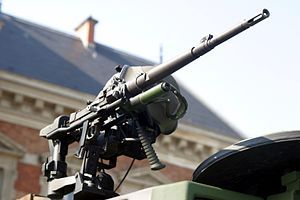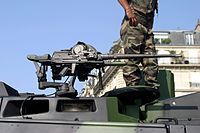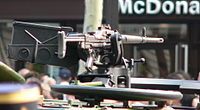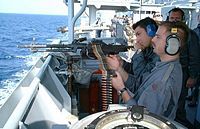AA-52 machine gun
| AA-52 | |
|---|---|
 AA-52 mounted on a Leclerc main battle tank | |
| Type | General-purpose machine gun |
| Place of origin | France |
| Service history | |
| In service | 1952–present |
| Used by | See Users |
| Wars | Algerian war[1] Chadian Civil War[2] Shaba II[3] Lebanese Civil War[4] Gulf War Bosnian War War in Afghanistan Ivorian Civil Wars 2011 Libyan uprising[5] Syrian Civil War[citation needed] Centrafrican Civil War[6] Operation Serval Russo-Ukrainian War[7][8] |
| Production history | |
| Designed | 1952 |
| Manufacturer | Manufacture d'armes de Saint-Étienne (MAS) |
| Variants | NF-1 M.A.C. 58 |
| Specifications | |
| Mass | 9.97 kg (22.0 lb) |
| Length | 1,080 mm (43 in) |
| Barrel length | 600 mm (24 in) |
| Cartridge | 7.5×54mm French 7.62×51mm NATO |
| Caliber | 7.5 mm 7.62 mm |
| Action | Lever-delayed blowback |
| Rate of fire | 900 round/min |
| Muzzle velocity | 830 m/s (2,700 ft/s) |
| Effective firing range | 600 m (660 yd) |
| Maximum firing range | 3,200 m (3,500 yd) |
| Feed system | 50-round non-disintegrating belt |
| Sights | Iron Removable APX (SOM) telescopic sights IR scope |
The AA-52 (full designation in French: Arme Automatique Transformable Modèle 1952, "Transformable automatic weapon model 1952") is one of the first French-produced guns of the post–World War II era. It was manufactured by the French government-owned Manufacture d'armes de Saint-Étienne (MAS) company. The AA-52 is still used today as a vehicle-mounted weapon due to large quantities in service, but has been replaced in the helicopter role by the Belgian FN MAG, starting with the EC 725 Caracal of the special operations units and the Air Force search and rescue teams. The AA-52 had been largely phased out for infantry use in favour of the lighter FN Minimi but remains in use.
History
[edit]The AA-52 general-purpose machine gun was conceived and developed following the French military's experiences in the First Indochina War during the early 1950s. At that time, the French army was equipped with an assortment of weapons from British and American sources, as well as some German weapons from the Second World War.
Effective supply of ammunition and replacement parts was an almost insoluble task and the army decided to adopt a standard machine gun. The result was the AA-52, conceived for ease of production. The construction is of simple welded stamped sheet steel.
The AA-52 was partially withdrawn from the service of the French army in 2008. It was replaced in the 2010s by 10,881 FN MAG general-purpose machine guns.[9][10]
Design
[edit]The AA-52 is a peculiar weapon among modern machine guns because it uses lever-delayed blowback operation, also seen in the FAMAS rifle, manufactured at the same factory. When firing, the pressure pushing the case head rearward initiates an impulse on a cam that sends the bolt carrier rearward. After a certain distance, a link (in this case the firing pin) pulls the bolt head, hence extracting the spent case. Since there is no primary extraction, the chamber is fluted to allow powder gases to flow back, unsticking the case from the chamber wall as with Heckler & Koch–type roller-delayed blowback weapons.
The feed and trigger mechanisms are derived from the MG 42.
The AA-52 can be used as a light machine gun with a bipod or as a heavy machine gun with a tripod. When used with a tripod for continuous fire, the gun is fitted with a heavier barrel. In the light machine gun configuration, the AA-52 is a relatively light weapon to carry. The AA-52 can be fired from the shoulder, but this is slightly awkward because of the position of the handle; however, the bipod can be used as a handguard when not in use. The barrel is changed by pressing a latch and rotating it a quarter of a turn. The APX(SOM) telescopic sight used on the MAS-49 and the FR-F1 sniper rifle can be mounted on the AA-52 as well as an infrared night sight.
-
AA-52 machine gun on display.
Variants
[edit]NF-1
[edit]The AA-52 originally used the standard 7.5×54mm French cartridge. The general adoption of the 7.62×51mm NATO cartridge reduced the opportunity for export sales, and the gun was adapted for this standard NATO calibre. The new, adapted gun was designated AANF-1 (also ANF-1 or NF-1).[11]
MAC-58
[edit]The MAC-58 was a version of the AA-52 chambered in .50 BMG. A few prototypes were tested and one retained for preserial production, but it never reached production due to the large quantity of US M2 Browning machine guns already in service with the French armed forces.
Users
[edit]
 Argentina[12]
Argentina[12] Belgium: Twin AA-52 machine guns were found in Fouga Magister attack aircraft.[13]
Belgium: Twin AA-52 machine guns were found in Fouga Magister attack aircraft.[13] Benin[14]
Benin[14] Bolivia [15]
Bolivia [15] Burkina Faso[14]
Burkina Faso[14] Cameroon[16]
Cameroon[16] Central African Republic[14]
Central African Republic[14] Comoros[14]
Comoros[14] Côte d'Ivoire[14]
Côte d'Ivoire[14] Djibouti[14]
Djibouti[14] Dominican Republic
Dominican Republic France: F1 variant.[14]
France: F1 variant.[14] Gabon[14]
Gabon[14] Georgia: used some ANF1 to protect Camp Warehouse, Afghanistan, under French command.[17]
Georgia: used some ANF1 to protect Camp Warehouse, Afghanistan, under French command.[17] Indonesia: AAT-F1 variant mounted on AMX-10 PAC 90 of Korps Marinir.[18]
Indonesia: AAT-F1 variant mounted on AMX-10 PAC 90 of Korps Marinir.[18] Ireland: Twin AA-52 7.62mm machine guns were fitted to the Irish Panhard AML 60-7 CS armoured cars.[19]
Ireland: Twin AA-52 7.62mm machine guns were fitted to the Irish Panhard AML 60-7 CS armoured cars.[19] Ivory Coast[20]
Ivory Coast[20] Lebanon mounted on VAB mephisto[citation needed]
Lebanon mounted on VAB mephisto[citation needed] Madagascar[14]
Madagascar[14] Mali: Armed and Security Forces of Mali[14]
Mali: Armed and Security Forces of Mali[14] Mauritania[14]
Mauritania[14] Morocco: F1 variant.[14]
Morocco: F1 variant.[14] Niger[14]
Niger[14] Senegal[14]
Senegal[14] Seychelles[14]
Seychelles[14] Somalia[14]
Somalia[14] Togo[14]
Togo[14] Tunisia[21]
Tunisia[21] Ukraine[22]
Ukraine[22]
References
[edit]- ^ Huon, Jean (March 1992). "L'armement français en A.F.N." Gazette des Armes (in French). No. 220. pp. 12–16. Archived from the original on 2018-10-08. Retrieved 2018-10-08.
- ^ Windrow, Martin (26 Sep 1985). French Foreign Legion Paratroops. Elite 6. Osprey Publishing. p. 56. ISBN 9780850456295.
- ^ Sicard, Jacques (November 1982). "Les armes de Kolwezi". La Gazette des armes (in French). No. 111. pp. 25–30. Archived from the original on 2018-10-19. Retrieved 2018-11-19.
- ^ Laffin, John (1985). The War of Desperation: Lebanon. UK: Osprey. pp. 179–183. ISBN 978-0850456035.
- ^ "Image: 3650079973.jpg, (450 × 688 px)". theatrum-belli.com. Archived from the original on 2012-02-01. Retrieved 2015-09-03.[better source needed]
- ^ Bona, Morgane (23 September 2014). "La France dans le piège centrafricain". Marianne. Archived from the original on 25 January 2019. Retrieved 25 January 2019.
- ^ "French VAB APCs Already in Ukraine (video)". Jul 29, 2022.
- ^ "Arms For Ukraine: French Weapons Deliveries To Kyiv". Jul 13, 2022.
- ^ "L'armée française fait ses emplettes en Belgique 18 January 2011 (French)". 18 January 2011. Archived from the original on 23 February 2017. Retrieved 23 February 2017.
- ^ "FN Herstal wins French Competition for 7.62 Machine Guns". Fnherstal.com. Archived from the original on 2016-08-04. Retrieved 2011-06-24.
- ^ French AANF1 machine gun in Ukrainian Defense Forces
- ^ Husson, Jean-Pierre (2000). Encyclopédie des forces spéciales du monde. Vol. Tome 1, De A à L (d'Afghanistan à Luxembourg). Histoire et Collections. p. 76. ISBN 9782908182910.
- ^ "Archived copy". Archived from the original on 2014-03-31. Retrieved 2012-08-24.
{{cite web}}: CS1 maint: archived copy as title (link) - ^ a b c d e f g h i j k l m n o p q Jones, Richard D.; Ness, Leland S., eds. (January 27, 2009). Jane's Infantry Weapons 2009/2010 (35th ed.). Coulsdon: Jane's Information Group. ISBN 978-0-7106-2869-5.
- ^ Ezell, Edward (1988). Small Arms Today. Vol. 2nd. Stackpole Books. p. 66. ISBN 0811722805.
- ^ Gain, Nathan (28 January 2016). "French gift to Cameroon". forcesoperations.com. Archived from the original on 15 November 2018. Retrieved 15 November 2018.
- ^ "25/11/09 - Afghanistan : à Warehouse, les Géorgiens succèdent aux Français (vidéo)". defense.gouv.fr (in French). 25 November 2009. Archived from the original on 25 January 2019. Retrieved 24 January 2019.
- ^ AAT-F1 Korps Marinir: Senapan Mesin Handal, Sukses Lepaskan 5 Ribu Butir Munisi Tanpa Masalah
- ^ Martin, Karl (2002). Irish Army Vehicles, transport and armour since 1922. Karl Martin. ISBN 0-9543413-0-9.
- ^ de Tessières, Savannah (April 2012). Enquête nationale sur les armes légères et de petit calibre en Côte d'Ivoire: les défis du contrôle des armes et de la lutte contre la violence armée avant la crise post-électorale (PDF) (Report). Special Report No. 14 (in French). UNDP, Commission Nationale de Lutte contre la Prolifération et la Circulation Illicite des Armes Légères et de Petit Calibre and Small Arms Survey. p. 74. Archived from the original (PDF) on 2018-10-09. Retrieved 2018-08-30.
- ^ "Ventes d'armes : la France fait profil bas en Libye et veut diversifier ses clients". Le Monde (in French). 26 October 2011. Archived from the original on 15 November 2018. Retrieved 15 November 2018.
- ^ "Arms For Ukraine: French Weapons Deliveries To Kyiv". Jul 13, 2022.
External links
[edit]- AAT Mod.52 / Mod. F1 at Modern Firearms




